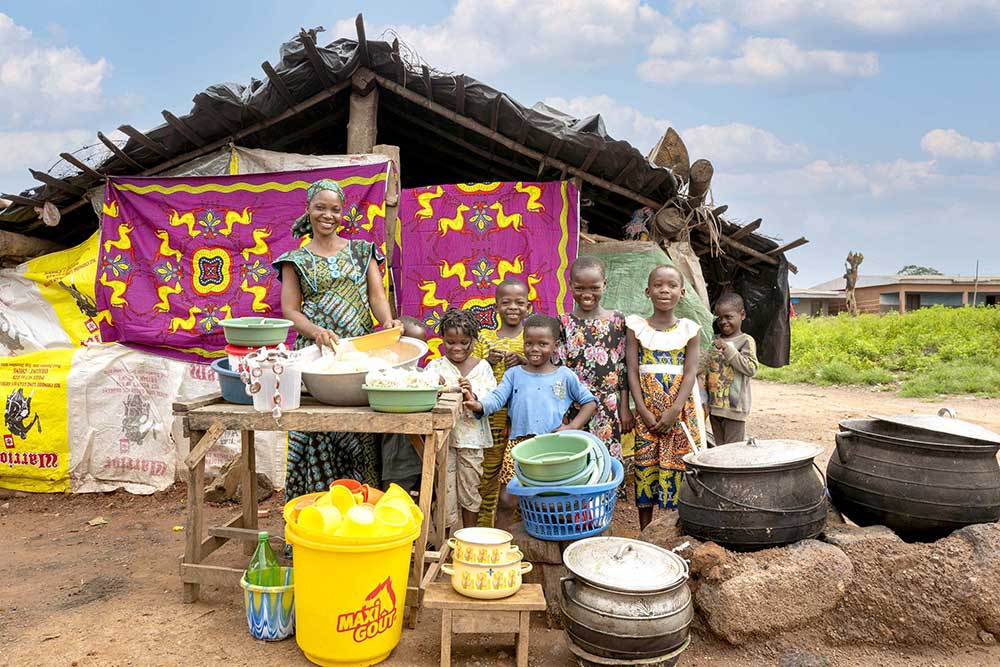Marie needed a new way to support her family in Côte d'Ivoire. So, Cargill helped her open a business.
Cargill-supported Village Savings and Loans Associations – commonly known as VSLAs – empower women entrepreneurs in cocoa communities
Read Time: 3 minutes
March 24, 2022
-
In cocoa-growing communities like Côte d'Ivoire, women provide nearly half the labor on farms, but income is not distributed equally.
-
A Cargill-supported savings and loan program — called Village Savings and Loans Association (VSLA) — helps advance women’s economic empowerment in cocoa communities.
-
Empowering women is a crucial component of the Cargill Cocoa Promise, our commitment to achieve a thriving and sustainable cocoa sector.
Marie Adjehi Nanou Bla and her husband were looking for solutions.
Her husband was a cocoa buyer in Côte d'Ivoire whose business had gone bankrupt. They had to figure out how to feed their four children, pay for school fees and cover other household expenses.
“I took care of housework, cleaning, the children and grew some food crops with a group of other women,” Marie says. “But none of this generated any income.”
So, Marie started her own business. Through a women’s group, she accessed a Cargill-supported program that helps women entrepreneurs save money and take out loans for income-generating endeavors. Marie used the money to start a business in Amangouakro in southeastern Côte d'Ivoire, where she sells frozen fish and chicken, eggs and gasoline.
It helped her become “completely financially independent” and provide for her family, says Marie, who started her business in 2019. “This is very rewarding for a woman to be able to help her husband.”
The savings and loans program Marie used — called Village Savings and Loans Association (VSLA) — helps support women’s economic empowerment. To boost this impact, Cargill recently launched a new effort with international humanitarian organization CARE and the Starbucks Foundation to establish 100 VSLAs for women in Côte d'Ivoire.
Empowered women are essential to the sustainability of the cocoa sector.”
“We are proud to now join forces with both CARE and The Starbucks Foundation to scale up the VSLA model,” Clancy says, “and help women to build their capacity to become income generators in their own right as farmers, as entrepreneurs and across families.”
It’s also part of a broader effort: Cargill-sustained VSLAs have supported nearly 7,000 women in Côte d'Ivoire and Ghana, two key countries for our global cocoa production.
How VSLAs work
Village Savings and Loans Associations (VSLAs) provide community members with a safe way to save money and access loans. Based on an ancient African practice of group savings, VSLAs generally run over three or 12 months with 30 to 40 women involved. Each member makes a fixed deposit at weekly meetings, and at the end of the project, the amount saved is paid back to the women at an agreed savings rate. Learn more.
The power of empowering women
In cocoa communities like Côte d'Ivoire, women provide nearly half the labor on farms. Yet income is not distributed equally. Women own less of the land. And they have much less access to training, markets and finance.
Helping women earn more household income provides more money for food and education, two key factors in reducing the risk of child labor.
Empowering women also is a crucial component of the Cargill Cocoa Promise, our commitment to achieve a thriving and sustainable cocoa sector for generations to come.
 Blandine Bli Lou Tanan (left) used the money from a Cargill-supported loan program to start a small restaurant outside the front of her home in Ouarébota, Côte d'Ivoire.
Blandine Bli Lou Tanan (left) used the money from a Cargill-supported loan program to start a small restaurant outside the front of her home in Ouarébota, Côte d'Ivoire.
‘…Dare and take the step’
This includes women like Blandine Bli Lou Tanan. Blandine and her family, which includes eight children, previously lived on income from cocoa and a small crop-growing operation. “But at the end of each cocoa harvest, we were unable to pay for all our schooling, food and children’s healthcare expenses,” Blandine shares.
She applied for a loan program Cargill supports and started a small restaurant outside the front door of her home in Ouarébota. Blandine became another financial contributor to help improve her family’s economic resilience. And she became a role model for others.
“I motivated my sisters to dare and take the step,” Blandine says, “to borrow money [in a safe and secure way] in order to build a future and exist.”
To learn more about Cargill’s cocoa and chocolate sustainability efforts, visit the Sustainable Cocoa website and read the latest Cargill Cocoa and Chocolate Sustainability Progress Report.
